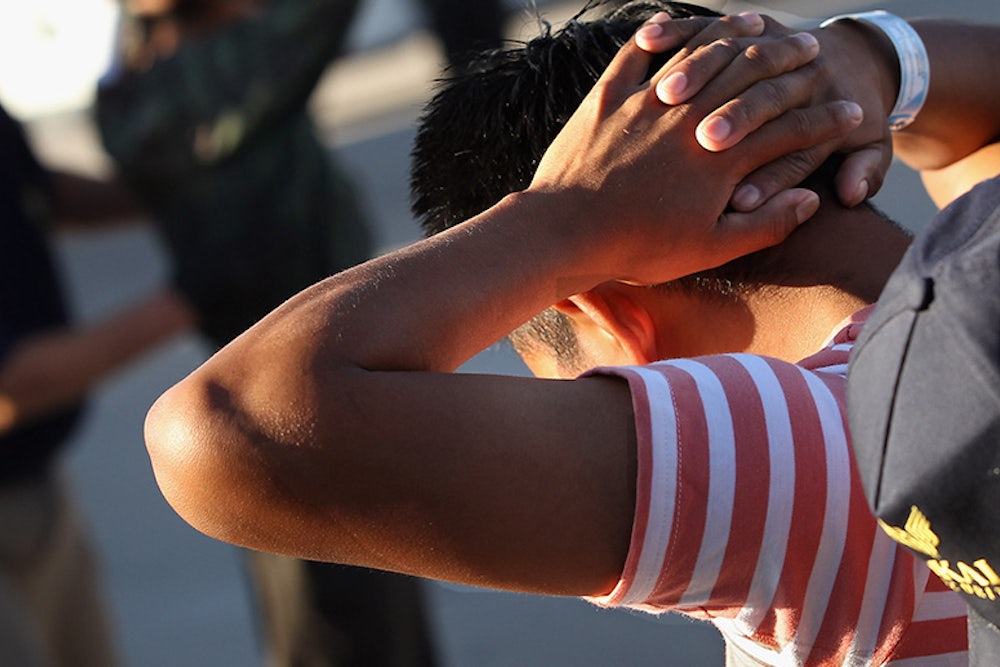President Obama is soon expected to take a step toward fixing our broken immigration system by issuing an executive order to halt deportations of undocumented immigrants whose children are U.S. citizens. Republicans, including Speaker of the House John Boehner and new Senate Majority Leader Mitch McConnell, have threatened reprisals against such an order. But one thing is clear: The president has the constitutional authority to decide to not proceed with deportations. It has always been within the president’s discretion to decide whether to have the Department of Justice enforce a particular law. As the Supreme Court declared in United States v. Nixon, “the Executive Branch has exclusive authority and absolute discretion to decide whether to prosecute a case.”
A president may choose to not enforce particular laws when deciding how to allocate scarce resources or based on his view of the best public policy. Few object, for example, when the Department of Justice does not prosecute those who possess small amounts of marijuana, even though they violated the federal Controlled Substance Act. There are countless federal laws that go unenforced. In 1800, then congressman and later Chief Justice John Marshall stated, the president may “direct that the criminal be prosecuted no further” because it is “the exercise of an indubitable and constitutional power.”
The president’s broad prosecutorial discretion has been repeatedly recognized by the courts. In 2013, Judge Brett Kavanaugh of the D.C. Circuit, appointed by George W. Bush, offered a strong defense: “The president may decline to prosecute certain violators of federal law just as the president may pardon certain violators of federal law,” Judge Kavanaugh wrote. “The president may decline to prosecute or may pardon because of the president’s own constitutional concerns about a law or because of policy objections to the law, among other reasons.”
This prosecutorial discretion is even greater in immigration because the treatment of foreign citizens is inextricably intertwined with the nation’s foreign affairs, an area especially under the president’s control. For example, the Supreme Court’s decision in 2010 to overturn large parts of Arizona’s restrictive immigration law, SB1070, was premised on the executive branch’s need for discretion in the immigration context. “A principal feature of the removal system is the broad discretion exercised by immigration officials,” the Court wrote, adding that “[t]he dynamic nature of relations with other countries requires the Executive Branch to ensure that enforcement policies are consistent with this Nation’s foreign policy with respect to these and other realities.” In a similar 1941 case, Hines v. Davidowitz, the Supreme Court voided a Pennsylvania system of alien registration because “experience has shown that international controversies of the gravest moment, sometimes even leading to war, may arise from real or imagined wrongs to another’s subjects inflicted, or permitted, by a government.”
Indeed, presidents of both parties have tailored immigration policy to their own goals. In 1987, the Reagan administration took executive action to limit deportations for 200,000 Nicaraguan exiles, even those who had been turned down for asylum. Similarly, President George H.W. Bush in 1990 limited deportations of Chinese students and in 1991 kept hundreds of Kuwait citizens from being deported. President Bill Clinton regularly used his power of prosecutorial discretion to limit deportations; in 1993 he gave 18-month extensions to Salvadoran residents, in 1997 he limited deportations for Haitians, and in 1998 he limited deportations to Central American counties that had been devastated by hurricanes.
President George W. Bush also took major steps to limit deportations on humanitarian grounds. In 2001, he limited deportation of Salvadorian citizens at the request of the Salvadorian president who said that their remittances were a key part of their nation’s economy. The Bush administration embraced prosecutorial discretion and ordered the consideration of factors such as whether a mom was nursing a child or whether an undocumented person was a U.S. military veteran in making the determination on whether to order a deportation.
The Bush administration explicitly recognized that humanitarian factors must play into the deportation decision. The 2005 Howard memorandum issued by Immigrations and Customs Enforcement (ICE) stated that “Prosecutorial discretion is a very significant tool ...to deal with the difficult, complex and contradictory provisions of the immigration laws and cases involving human suffering and hardship.” Today, the Obama administration can build on that to stop deportations that separate parents from their children. The breaking up of families due to deportations undoubtedly causes human suffering and hardship: The Applied Research Center in its “Shattered Families” report found that over 5,000 children live in U.S. foster homes because their parents were deported.
The federal courts, too, have recognized that presidents inherently have the power to choose not to enforce immigration laws in a particular instance and thus to not initiate deportation proceedings even when a person is not lawfully in the country. In a famous case involving John Lennon, the United States Court of Appeals for the District of Columbia Circuit held that the president could issue an “an informal administrative stay of deportation” to allow Lennon to remain in the country. The case, INS v. Lennon, allowed the executive branch to halt the deportation of Lennon and expressly recognized president’s constitutional power to exercise prosecutorial discretion in the immigration context.
The president clearly has the power to limit deportation of an individual or a group of individuals, even a large group. Such action does not grant citizenship to the undocumented; it merely is a temporary measure that halts deportations. It is not a permanent fix to the intractable challenge of how to deal with undocumented immigration, but it is increasingly looking like the only solution that the president has in facing an intransigent Congress that is unwilling to act.
